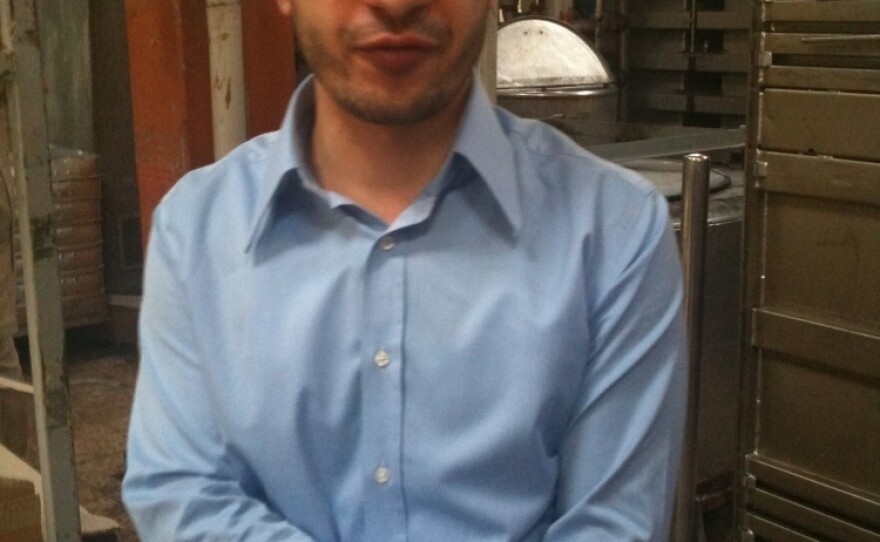In the open-air restaurants of Gaziantep in southern Turkey, the summer season has begun, but Syrian tourists who flocked here for the past few years are absent. And Turks no longer make the 90-minute drive to Aleppo, Syria's largest northern city, for bargain holidays.
At a local trade fair, Syrians came to attract business partners. Ayala Zenio acknowledged that Turks are now reluctant to open new deals because of the unrest in Syria, but she insists the coverage in the Western media is wrong.
"It's not so much like the TV show, us," she says.
When asked if she's worried, she replies: "Sometimes I am afraid [for] ... the future, what will happen. I hope that everything will be OK."
The economies of Aleppo, Syria's northern business center, and Gaziantep have been stalled by Syria's protest movement and the government's violent response.
A Centerpiece Of Turkish Policy
"It's been going well all these years — until this year," says Mustapha Mutafugulu, who runs a textile factory in the Turkish town. "This year, we've got some economical problems."
During a tour of his textile factory, Mutafugulu said he opened the first and largest textile plant in Aleppo in 2001. Now, he says, many businesses in Aleppo have shut down, salaries are unpaid, hotels empty — all because of the protests and violence in other parts of the country.

"There is no business in the local market because it affected the economy too much," he says. "They hide away the money — and the people [are] afraid."
Just a few months ago, the Syrian-Turkish business and political alliance was hailed as a way to modernize Syria to lure the country from Iran's orbit. The relationship brought rewards for Turkish business and a political model for Syrians, says Turkish analyst Soli Ozul.
"Those tens of thousands of Syrians who have been able to come to Turkey because there is no longer a visa requirement and have seen the way we live — that must have had some effect on how they perceive their own life conditions," he says.
Turkey lifted visa requirements for Syrians two years ago.
Asked how important Syria is to Turkish policy, Ozul says: "It's the centerpiece of the government's Middle East policy; the north part of Syria is becoming an extension of the Turkish economy."
This is why, Ozul says, Turkey urged Syrian President Bashar Assad to reform before it's too late.
A Shift In Policy
But Turkey has had little influence, says Gokhan Bacik, who runs a Middle East study center in Gaziantep. He predicts Turkish policy will get tougher soon because the government has concluded the Syrian regime cannot survive without meeting at least some of the protesters' demands.
"Turkey is changing her mind about what's happening in Syria, because in the beginning, Turkey had expected that the regime in Syria wouldn't use violence against its own people, but it's a fact, the regime in Syria is using violence," Bacik says.
Over the past week, Turkey has hosted a meeting of Syrian opposition members, and stationed ambulances on the border to rescue the wounded, even sending officials to process refugees crossing on mountain paths.
These are unmistakable signs, Ozul says, of a shift for Turkey.
"It is kind of investing, perhaps informally, in the future as well, which I think is what infuriates the regime right now," he says. "I doubt the regime feels as warm toward Turkey as it did four months ago."
Syrian shoppers still go to Gaziantep's largest mall. In private conversations, they say they do not believe Assad can find a way out of the crisis. One 25-year-old who was willing to speak responded quickly and sharply when asked if Assad can bring reforms. She said Assad isn't a dictator like his father, the late Hafez Assad, but he can't challenge his inner circle, which is determined to crush the protest movement at any cost.
"I don't think it will go on the way it is — something will happen, at some point, because everyone's eyes have been opened," she said.
In northern Syria, those eyes have turned toward Turkey. It was the place they hoped would lead to a better life. Now, many see Turkey as a place to escape violence in their own country.
Copyright 2022 NPR. To see more, visit https://www.npr.org. 9(MDAzMjM2NDYzMDEyMzc1Njk5NjAxNzY3OQ001))






